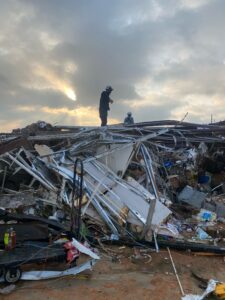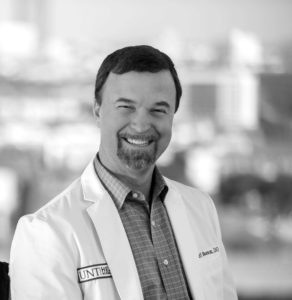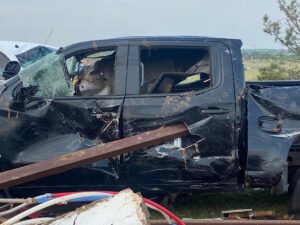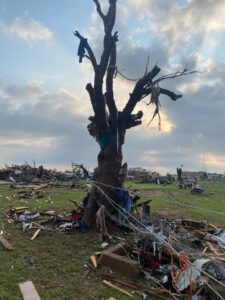HSC’s Dr. Jeff Beeson serves during disasters
- July 6, 2023
- By: Eric Griffey
- Our People
 Dr. Jeff Beeson hadn’t slept in nearly two days. As he surveyed the rubble of crumbled plywood, brick and mangled vehicles that dotted the Matador, Texas landscape, a fellow rescue worker came by to give him a sandwich for lunch.
Dr. Jeff Beeson hadn’t slept in nearly two days. As he surveyed the rubble of crumbled plywood, brick and mangled vehicles that dotted the Matador, Texas landscape, a fellow rescue worker came by to give him a sandwich for lunch.
The University of North Texas Health Science Center at Fort Worth’s vice president of clinical partnerships had been home only two of the previous seven days, as he served the medical needs of those impacted by a recent string of violent storms that ravaged the region. His role as the medical team manager for the state’s urban search and rescue team kept him on the road over the Father’s Day weekend.
“They’re all good people here,” said Beeson, who also serves as HSC’s medical officer for external events within Health Systems Division. “They’re all very thankful. Everybody in the region is coming out and trying to give us donations and we’re like, ‘Listen. We don’t need anything. We don’t need food or drink. Give it to the locals.’ Human nature is good. When disasters happen, everybody steps up and wants to help.”
Beeson and his search and rescue team composed of people from more than 60 municipal and state sponsoring organizations faced the looming threat of more storms to come, as temperatures soared into triple digits in late June. Crews worked around the clock without power in Matador, a town of 600, about 80 miles northeast of Lubbock.
 The tragedy in Matador came just a week after a ferocious series of storms pummeled the South, spawning a tornado in Perryton, Texas, 200 miles north of Matador, in addition to flooding in the western parts of Texas and severe power outages in the eastern parts of the state.
The tragedy in Matador came just a week after a ferocious series of storms pummeled the South, spawning a tornado in Perryton, Texas, 200 miles north of Matador, in addition to flooding in the western parts of Texas and severe power outages in the eastern parts of the state.
Beeson and his search and rescue team spend their days in places like Perryton and Matador sifting through the debris looking for people trapped beneath. He works with search specialists who use listening devices and cameras, dogs trained to sniff out anyone trapped, rescuers who understand the complex Tetris of the heaps of rubble, a team who uses saws and other equipment to safely search the piles, paramedics and others. Beeson’s role is caretaker: for the rescued and rescuers — and even the dogs.
Beeson said having a front-row seat the devastation exacted by Mother Nature is never easy. He tries to focus on his task and be a support for the victims and rescue workers.
“It’s always hard,” he said. “I was just at a house and there were college-aged girls from Texas Tech who came home to help mom and dad dig through the pieces of their childhood home, which is gone. They’re climbing over rubble piles, picking through their clothes. I watched as one girl picked up a little doll shoe that I’m sure had sparked some memory in her life. It’s completely devastating.”
 “We’re helping people who are putting everything they own in a soaking-wet plastic bag,” he continued. “It’s pretty emotional. You feel sorry for people, but you do what you can to help and get ready for the next one.”
“We’re helping people who are putting everything they own in a soaking-wet plastic bag,” he continued. “It’s pretty emotional. You feel sorry for people, but you do what you can to help and get ready for the next one.”
Beeson has spent more than 30 years working in public safety and population health. He started his career as an emergency medical technician working in rural Texas. After earning a degree in nursing, he became a paramedic and registered nurse working in emergency departments and with air medical flight programs. He later attended medical school at HSC’s Texas College of Osteopathic Medicine — where his father was hired as the first police chief of the campus in 1977.
“Disaster preparedness, response and recovery trainings are becoming more imperative for health care professionals as the number and severity of natural disasters continue to increase,” said Jessica Rangel, HSC’s executive vice president of health systems. “The need for medical attention during disaster response and recovery is truly unprecedented. Dr. Jeff Beeson and others like him are truly living the HSC mission by responding when disaster strikes.
“As an emergency medicine physician in a disaster setting, he provides medical expertise and stabilization of those injured in the field with minimal resources. Wilderness medicine, street medicine, emergency medicine and disaster medicine are all integral to our communities. Examples and opportunities to serve like this pave the way for HSC students to make an impact in future disaster scenarios. Last year, several students participated in disaster medical relief during the Possum Kingdom fires. Undoubtedly, there will be more opportunities to serve our communities and Dr. Jeff Beeson will continue to lead the way.”
Remaining calm and steady during a catastrophe is nothing new for Beeson. He has served on the search and rescue team for 13 years. The Matador tornado, he said, was his 15th major disaster response. He treated patients during Hurricane Katrina, the explosion in West, Texas and many hurricanes throughout the gulf coast.
“We just watch the weather and stay in communication,” he said of his team’s constant state of readiness. “After we get done with this trip, we go back and get our supplies and equipment ready to go for the next one. It’s kind of crazy.”






Social media